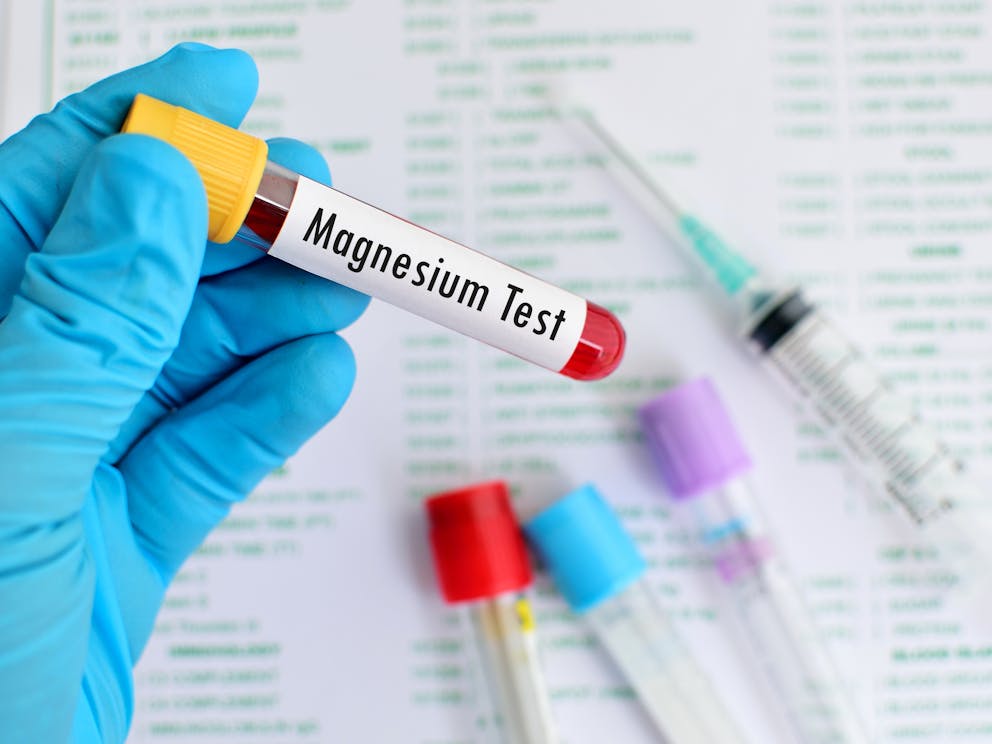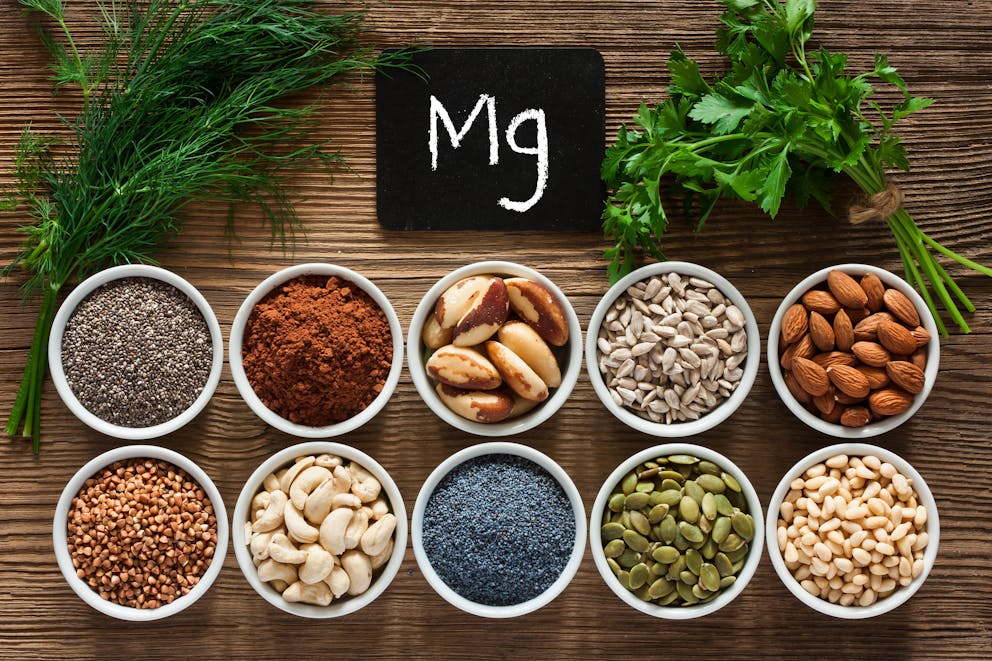Magnesium Deficiency: Symptoms, Causes, and Solutions
Magnesium deficiency, also known as hypomagnesemia, is characterized by insufficient levels of magnesium, an essential mineral that regulates hundreds of biochemical processes.
Let’s look at common magnesium deficiency symptoms and discover how to raise magnesium levels quickly.

What is magnesium deficiency?
Magnesium is crucial for numerous metabolic and cellular processes, including muscle and brain function, blood sugar control, blood pressure regulation, and energy production.
Magnesium deficiency occurs when magnesium stores are insufficient to maintain normal physiological functions.
“Almost 50 percent of adults don’t consume enough magnesium,” explains Dr. Berg. “Magnesium deficiency can have serious health implications including an increased risk of cardiovascular disease, impaired muscle function, and poor mental health.”
Magnesium deficiency symptoms
Magnesium is a critical cofactor for various enzymes needed to regulate hundreds of biochemical pathways. It plays a crucial role in energy production and muscle function, which explains why low exercise tolerance is often one of the first signs of magnesium deficiency.
Magnesium is involved in many physiological processes, and hypomagnesemia can manifest in a wide range of health issues. Here are common signs of magnesium deficiency:
Migraine headaches
Fatigue
Poor blood sugar control
Muscle cramps and spasms
Anxiety and depression
Muscle weakness
Abnormal heart rhythm
Numbness or tingling
Magnesium is also needed for the absorption and activation of vitamin D, which explains why magnesium deficiency can cause side effects of vitamin D, such as palpitations, insomnia, headaches, anxiety, and restlessness.
If you're experiencing symptoms of magnesium deficiency, it's essential to consult a healthcare professional for a comprehensive health assessment to diagnose potential magnesium deficiency.

Magnesium deficiency causes
While poor dietary intake of magnesium-rich foods is a leading cause of deficiency, there are other potential risk factors linked to low magnesium status.
Research published in Open Heart found that “Chronic diseases, medications, decreases in food crop magnesium contents, and the availability of refined and processed foods leaves the vast majority of people at risk for magnesium deficiency.”
Health conditions such as Crohn's disease, low stomach acid, and chronic diarrhea interfere with intestinal magnesium absorption and can contribute to severe magnesium deficiency.
There also is evidence that certain medications, including antibiotics, diuretics, and proton pump inhibitors (PPIs), can trigger accelerated magnesium loss or impair magnesium absorption.
In addition, excessive alcohol consumption can significantly reduce the body’s ability to absorb minerals, leaving regular drinkers at increased risk of low magnesium status.

Testing for magnesium deficiency
Clinical magnesium deficiency is diagnosed when blood magnesium levels are below 1.3 mg per deciliter.
However, most magnesium is stored in bone, and only small amounts circulate in the blood. This means that blood tests may not be adequate to determine an individual’s magnesium stores.
While blood tests give some indication of magnesium status, a more reliable approach to detect potential deficiency is to perform a magnesium loading test if there are clinical indications of magnesium deficiency.
A magnesium loading test involves administering intravenous magnesium and measuring the rate of urinary magnesium excretion, which can provide a more comprehensive insight into magnesium status.
How to replenish magnesium
Replenishing magnesium typically requires maintaining a diet rich in magnesium-containing foods and addressing any potential underlying medical condition that can affect magnesium absorption.
A study published in The Journal of Endocrinology suggests that a daily magnesium intake of 420 mg for adult males and 320 mg for adult females maintains adequate body stores and prevents deficiency.
Unfortunately, soil mineral levels have steadily declined over the last few decades, and obtaining all the magnesium you need from foods alone can be difficult.
Supplementation offers a safe and convenient way to promote healthy magnesium levels. However, there are many different magnesium supplements available, and it can be challenging to determine the best and worst types of magnesium for your specific health needs.
Magnesium citrate, threonate, glycinate, and taurate are highly bioavailable and generally considered the most effective elemental forms of magnesium.
Other types of magnesium are not as well absorbed and may increase the risk of side effects such as abdominal cramping, nausea, or diarrhea.
Avoid These Types of Magnesium
These forms of magnesium should be avoided or only be taken under the supervision of a healthcare provider:
Magnesium sulfate
Magnesium oxide
Magnesium chloride
Magnesium carbonate
It’s important to note that taking too much magnesium can cause dangerously elevated blood magnesium levels, and it’s crucial to carefully follow the instructions of the magnesium supplement you plan to use.
Sources of magnesium
While whole grains are often listed as an excellent source of magnesium, they also contain phytates, a plant compound that inhibits intestinal magnesium absorption by up to 60 percent.
Luckily, there are plenty of magnesium-rich foods with low phytate content.
Here are some of the top sources of magnesium:
Chia seeds
Spinach
Avocados
Green leafy vegetables
Dark chocolate
Almonds
Oily fish
Dairy products

Benefits of magnesium
Magnesium helps maintain strong bones and is essential for various enzymatic reactions needed for energy production, protein synthesis, muscle function, and hormonal balance.
There are many health benefits of magnesium, and research published in Scientifica suggests that magnesium can be effective in preventing and managing various health issues.
Here are several health conditions that may benefit from magnesium supplementation:
Hypertension
Metabolic syndrome
Diabetes
Severe asthma
Hyperlipidemia
Premenstrual syndrome
Cardiac arrhythmia

Key takeaways
Magnesium helps maintain metabolic, cardiovascular, musculoskeletal, and cognitive health. Unfortunately, more than 50 percent of adults have inadequate magnesium levels or are at risk of deficiency.
Low dietary magnesium intake, regular alcohol consumption, certain medications, and digestive issues can result in magnesium deficiency symptoms, including muscle spasms, irregular heartbeats, insomnia, migraines, and elevated blood pressure.
FAQ
1. What happens when your body is low on magnesium?
Magnesium is needed for energy-making processes, DNA synthesis, muscle function, hormone balance, and cognitive health.
Magnesium deficiency can impair these crucial functions, which can have detrimental health consequences, including metabolic and hormonal imbalances, muscular issues, and poor mental health.
2. What are signs that your body is deficient in magnesium?
Common signs of magnesium deficiency include low exercise tolerance, muscle spasms, elevated blood pressure, arrhythmia, insomnia, and anxiety.
3. Does vitamin D deplete magnesium?
Magnesium is needed to convert vitamin D3 into its active form, and taking large doses of vitamin D can contribute to low magnesium levels.
4. How can I raise my magnesium level quickly?
Consuming plenty of magnesium-rich foods helps raise your magnesium levels quickly.
In cases of severe deficiency, it’s recommended to take a magnesium supplement to obtain adequate dosages needed to replenish depleted body stores.
5. How much magnesium do I need each day?
The recommended daily magnesium intake ranges from 420 mg for adult men to 320 mg for adult women.
6. What are the most common magnesium deficiency symptoms?
The most common magnesium deficiency symptoms include low exercise tolerance, high blood pressure, muscle cramps, fatigue, irregular heartbeat, weakness, anxiety, and poor blood sugar control.
7. What are the best sources of magnesium?
Some of the best dietary sources of magnesium include pumpkin seeds, avocados, dark chocolate, almonds, dairy, and green leafy vegetables such as spinach, kale, and arugula.
8. What causes magnesium deficiency?
Lack of adequate dietary intake is the most common cause of magnesium deficiency.
However, magnesium deficiency can also be caused by regular alcohol consumption, digestive tract issues such as Crohn’s disease, and certain medications, including diuretics and antibiotics.
9. What is considered a magnesium deficiency?
A magnesium deficiency is typically diagnosed when magnesium serum levels are below 1.3 mg per deciliter.
It’s important to remember that blood magnesium levels don’t accurately reflect overall body stores, and it’s best to evaluate magnesium status based on deficiency symptoms and risk factors of hypomagnesemia.
10. How do I test for magnesium deficiency?
While blood tests do provide some insight into circulating magnesium levels, a magnesium loading test is generally considered a more accurate measurement of the body’s total magnesium stores.
This test administers magnesium intravenously and measures urinary output, which provides a more accurate assessment of magnesium status.
11. Who’s at risk for magnesium deficiency?
Individuals who consume a diet high in processed foods are more likely to develop magnesium deficiency compared to those who regularly consume whole foods such as seeds, nuts, and green leafy vegetables.
In addition, people who consume alcohol and those with gastrointestinal conditions such as celiac disease, Crohn's disease, and inflammatory bowel disease (IBD) often don’t absorb adequate amounts of magnesium and are at increased risk of deficiency.
12. How is magnesium deficiency treated?
Magnesium deficiency treatment typically involves magnesium supplementation, dietary changes to include magnesium-rich foods, and addressing potential underlying medical conditions that may contribute to low magnesium levels.
Tags

Popular
08/21/2024
55K views
02/23/2025
46.3K views
11/18/2024
277.5K views
03/18/2024
11/21/2022




